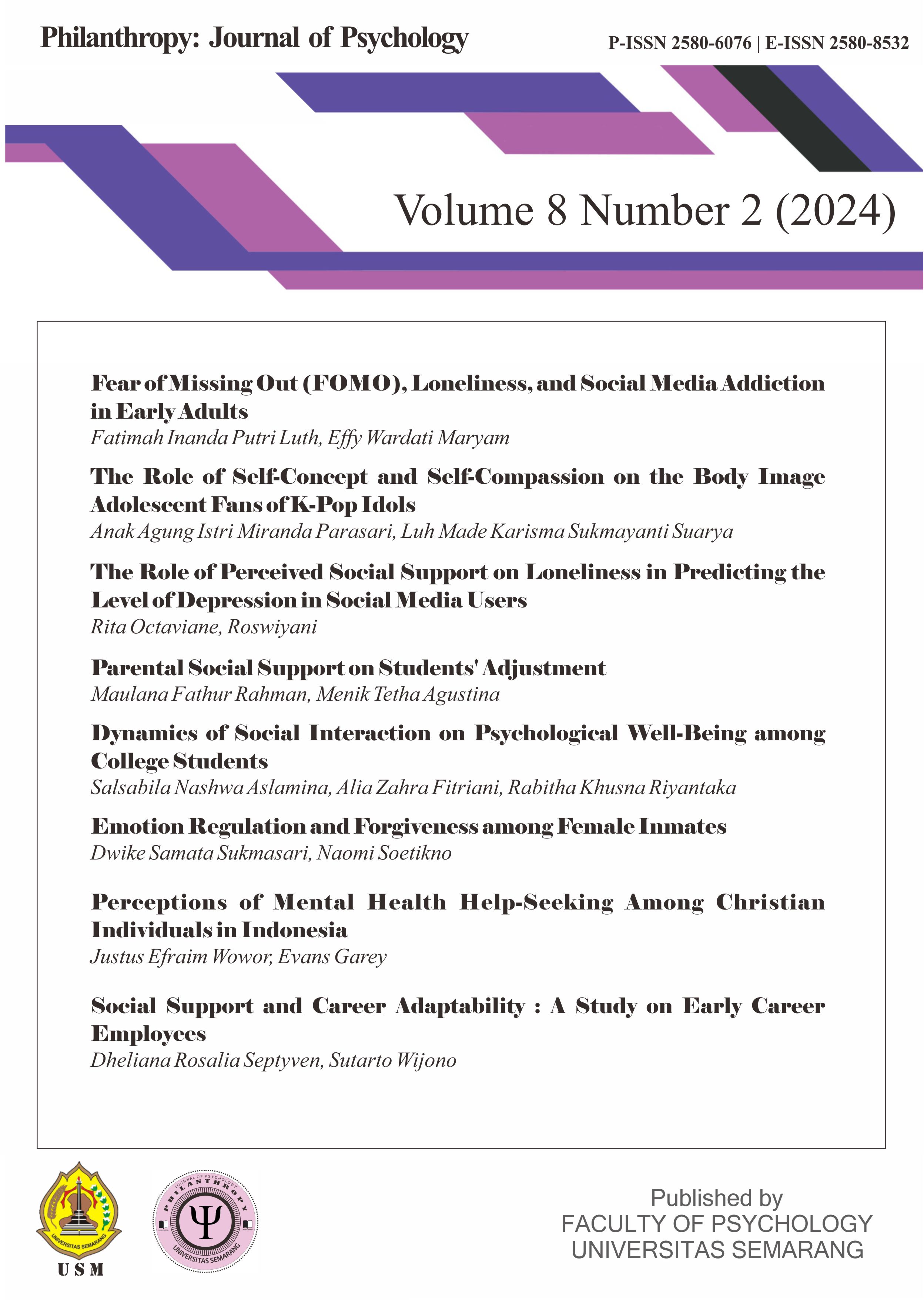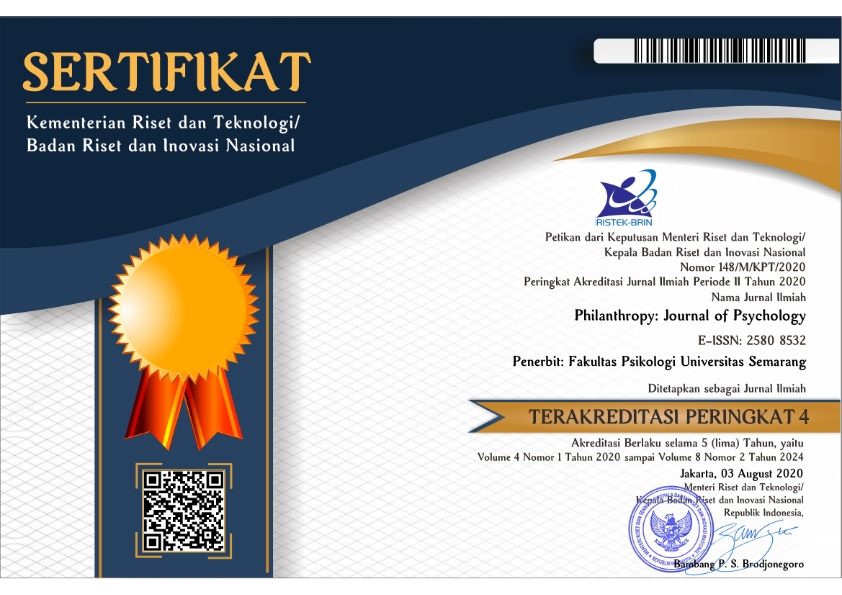Dynamics of Social Interaction on Psychological Well-Being among College Students
DOI:
https://doi.org/10.26623/philanthropy.v8i2.10769Abstract
Social interaction plays an important role in improving students' psychological well-being, especially in higher education environments. This study aims to analyze the effect of social interaction on students' psychological well-being. The research method used is quantitative, with a population of 240 students and a sample of 142 students. The sample was selected through a simple random sampling technique, and analyzed using a simple linear regression analysis technique. The results of the study showed a significant relationship between social interaction and psychological well-being, with a regression coefficient value of 0.254 and a p value <0.001, indicating a significant effect on the variable. The implications of this study indicate the importance for educational institutions to pay attention to aspects of social interaction in order to improve students' psychological well-being and develop beneficial social support during the study period. Keywords: Psychological Well-being; Social Interaction; StudentsReferences
Adi, H. (2022). Hubungan Antara Kepercayaan Diri dengan Interaksi Sosial Pada Mahasiswa Jurusan Psikologi UNISSULA Semarang. https://repository.unissula.ac.id/26817/1/30701601785_fullpdf.pdf
Ahmadi, D. (2008). Interaksi Simbolik: Suatu Pengantar. Mediator, 9(2), 301–316. https://ejournal.unisba.ac.id/index.php/mediator/article/view/1115/683
Alza Nur Zahrah, N., & Setyani Hadi Sukirno, R. (2022). Psychological Well-Being pada Mahasiswa Santri Ditinjau dari Dukungan Sosial & Stress Akademik. Jurnal Psikologi Integratif, 10(2), 189–205.
Chairunnisa, A., Arum, H. S., & Salamah, P. U. (2024). Pengaruh Hubungan dan Komunikasi Interpersonal Terhadap Aspek Psikologis: Sebuah Systematic Review. Jurnal Psikologi, 1(4), 14. https://doi.org/10.47134/pjp.v1i4.2717
Cohen, S., & Wills, T. A. (1985). Stress, social support, and the buffering hypothesis. Psychological Bulletin, 98(2), 310–357. https://psycnet.apa.org/doi/10.1037/0033-2909.98.2.310
Deci, E. L., & Ryan, R. M. (2000). The “What” and “Why” of Goal Pursuits: Human Needs and the Self-Determination of Behavior. Psychological Inquiry, 11(4), 227–268.
Distina, P. P. (2019). Pengembangan Dimensi Psychological Well-Being Untuk Pengurangan Risiko Gangguan Depresi. Mawa’izh: Jurnal Dakwah dan Pengembangan Sosial Kemanusiaan, 10(1), 39–59. https://doi.org/10.32923/maw.v10i1.768
Halim, C. F., & Dariyo, A. (2016). Hubungan Psychological Well-Being dengan Loneliness pada Mahasiswa yang Merantau Relationship between Psychological Well-Being and Loneliness among Overseas Student. In Jurnal Psikogenesis (Vol. 4, Issue 2).
Hertinjung, Ardiani, Ilhami, & Octiawati. (2022). Hubungan Rasa Syukur dan Resiliensi dengan Kesejahteraan Psikologis Remaja Selama Pandemi. Jurnal Ilmiah Fakultas Psikologi Universitas Yudharta Pasuruan, 9(2), 159–177. https://doi.org/10.35891/jip.v9i2
Hidayat, E., & Darmawanti, I. (2022). Hubungan antara Dukungan Sosial dengan Stres Akademik pada Mahasiswa di Masa Pandemi Covid-19. Character: Jurnal Penelitian Psikologi, 8(9).
Indah Roziah Cholilah, & Anugrah Sulistiyowati. (2022). Gratitude dan Psychological Well Being pada Penyintas Covid-19. Jurnal Riset Psikologi, 115–122. https://doi.org/10.29313/jrp.v2i2.1601
Indra Setiawan, A., Nanda Priyatama, A., & Abdul Hakim, M. (2022). Hubungan Antara Identitas Sosial dengan Perilaku Prososial pada Aktivis Komunitas Info Cegatan Jogja (ICJ). Jurnal Ilmiah Psikologi Candrajiwa, 7(1), 16–31. https://doi.org/10.20961/jip.v6i2.55992
Jannah, M., & Si, M. (2018). Metodologi Penelitian Kuantitatif untuk Psikologi. Unesa University Press.
Jordan, J. V. (2010). Relational-cultural therapy. American Psychological Association.
Khoirunnisa, A., & Rosiana, D. (2023). Pengaruh Perceived Social Support terhadap Psychological Well-Being Mahasiswa yang sedang Menyusun Skripsi. Humanitas, 7(3), 319–332.
Kurniasari, E., Rusmana, N., & Budiman, N. (2019). Gambaran Umum Kesejahteraan Psikologis Mahasiswa Universitas Pendidikan Indonesia. Journal of Innovative Counseling : Theory, Practice & Research, 3(2), 52–58. http://journal.umtas.ac.id/index.php/innovative_counseling
Lubis, S. (2024). Gambaran Psychological Well-Being Pada Mahasiswa Aktivis Kemanusiaan di Ranah Kebencanaan. https://rama.unimal.ac.id/id/eprint/323
Lyubomirsky, S., King, L., & Diener, E. (2005). The Benefits of Frequent Positive Affect: Does Happiness Lead to Success?. Psychological Bulletin, 131(6), 803–855. https://doi.org/10.1037/0033-2909.131.6.803
Maulana, D., Sardin, & Fajria, N. (2023). Pengaruh Aktivitas Mahasiswa dalam Organisasi Kemahasiswaan Terhadap Tingkat Keterampilan Sosial Mahasiswa FPIPS UPI. Jurnal Sosialisasi, 10(1), 175–186.
Noviasari, N., & Dariyo, A. (2016). Hubungan Psychological Well-Being dengan Penyesuaian Diri Pada Istri yang Tinggal di Rumah Mertua. Psikodimensia, 15(1), 134–151. https://journal.unika.ac.id/index.php/psi/article/view/596/447
Pasaribu, B., Herawati, A., Utomo, K., & Aji, R. (2022). Metodologi Penelitian. www.mediaedupustaka.co.id
Perloff, R. (1997). Daniel Goleman’s Emotional intelligence: Why it can matter more than IQ [Review of the book Emotional intelligence, by D. Goleman]. The Psychologist-Manager Journal, 1(1), 21–22. https://psycnet.apa.org/doi/10.1037/h0095822
Pluut, H., Curşeu, P. L., & Ilies, R. (2015). Social and Study Related Stressors and Resources Among University Entrants: Effects on Well-being and Academic Performance. Learning and Individual Differences, 37, 262–268. https://doi.org/10.1016/j.lindif.2014.11.018
Puji Lestari, I., Al Kautsar, M., & Tengah, J. (2013). Interaksi Sosial Komunitas Samin dengan Masyarakat Sekitar. Jurnal Komunitas, 5(1), 74–86. http://journal.unnes.ac.id/nju/index.php/komunitas
Rahama, K., & Izzati, U. (2021). Hubungan antara Dukungan Sosial dengan Psychological Well-Being pada Karyawan. Character: Jurnal Penelitian Psikologi, 8(7), 94–106.
Rochmahwati, Y., & Listyani, R. H. (2016). Interaksi Sosial Ibu-Ibu Rumah Tangga (Studi Interaksi Simbolik pada Kelompok Arisan Macaners). Paradigma, 04(02). https://ejournal.unesa.ac.id/index.php/paradigma/article/view/14946/13523
Salami, S. O. (2011). Psychosocial Predictors of Adjustment Among First Year College of Education Students. US-China Education Review, 8(2), 239–248. https://files.eric.ed.gov/fulltext/ED519567.pdf
Santoso, J. (2023). Mengatasi Tantangan Keterlibatan Mahasiswa: Strategi Efektif untuk Menciptakan Lingkungan Belajar yang Menarik. Jurnal Ilmiah Kanderang Tingang, 14(2), 469–478. https://doi.org/10.37304/jikt.v14i2.267
Sari, C. A. K., & Zaini, A. H. (2024). Peran Dukungan Sosial pada Penyesuaian Akademik Mahasiswa Baru dengan Resiliensi Akademik sebagai Mediator. Personifikasi: Jurnal Ilmu Psikologi, 15(1), 64–78. https://doi.org/10.21107/personifikasi.v15i1.23190
Sinaga, S. (2024). Hubungan Psychological Well-Being dengan Kepuasan Kerja pada Karyawan di PT. Wahana Putra Yudha Cluster Samosir. Universitas Medan Area.
Thoits, P. A. (2011). Mechanisms Linking Social Ties and Support To Physical and Mental Health. Journal of Health and Social Behavior, 52(2), 145-161.
Tsabita, A., Yuni, D., Hafidah, R., & Eka, N. (2021). Pengaruh Storytelling dalam Meningkatkan Kemampuan Empati Anak Usia Dini. Jurnal Pendidikan Anak, 10(2), 164–171.
Utami, M. P. (2024). Pengaruh Interaksi Sosial dalam Pergaulan terhadap Pengembangan Sikap Kepedulian Sosial Siswa Madrasah Ibtidaiyah. Jurnal Basicedu, 8(1), 71–82. https://doi.org/10.31004/basicedu.v8i1.6298
Wisnata, A. (2024). Pengaruh Interaksi Sosial Terhadap Kemampuan Komunikasi Matematika Siswa Kelas V Sekolah Dasar. Institut Agama Islam Negeri Curup.
Yuliani, I., & Negeri, S. (2018). Konsep Psychological Well-Being Serta Implikasinya dalam Bimbingan dan Konseling. Journal of Innovative Counseling 2(2), 51–56. http://journal.umtas.ac.id/index.php/innovative_counseling
Downloads
Additional Files
Published
Issue
Section
License
The author who will publish the manuscript at Philanthropy: Journal of Psychology, agree to the following terms:
- Authors retain copyright and grant the journal right of first publication with the work simultaneously licensed under a Creative Commons Attribution 4.0 International License (CC BY 4.0), that allows others to share the work with an acknowledgment of the work's authorship and initial publication in this journal.
- Authors are able to enter into separate, additional contractual arrangements for the non-exclusive distribution of the journal's published version of the work (e.g., post it to an institutional repository or publish it in a book), with an acknowledgment of its initial publication in this journal.
- Authors are permitted and encouraged to post their work online (e.g., in institutional repositories or on their website) prior to and during the submission process, as it can lead to productive exchanges, as well as earlier and greater citation of published work (See The Effect of Open Access).




